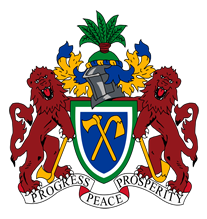The Gambia: Government
Key Figures
- Chief of State:
- President Adama Barrow
- Head of Government:
- President Adama Barrow
Overview
- Government Name:
- Republic of the Gambia
- Constitution:
- Adopted: 1996; Established strong presidential government, unicameral legislature, independent judiciary, and protection of human rights.
- Government Type:
- Presidential Republic

Index of Economic Freedom
Grades each country on a scale of 0 to 100, based on ten freedoms, with 100 representing the greatest amount of economic autonomy from government intervention. Source: Heritage Foundation (2023)
Country Risk Rating
There is no Country Risk Rating for The Gambia
Government Branches
| Main Powers | Election Process | Election Cycle 1 | |
|---|---|---|---|
| Executive | The president appoints the prime minister and the cabinet. The head of state is the prime minister who is in charge of day-to-day operations of the executive government. |
The president is elected by absolute majority vote with a 2 round system. |
5 years |
| Judicial | The supreme court and constitutional court uphold and interpret the constitution. |
Justices are appointed by the president after consultation with the Judicial Service Commission. |
Mandatory retirement age of 75 |
| Legislative | The parliament creates legislature and elects supreme court judges on president's recommendation. |
The legislative branch has 77 members elected through closed-list proportional representation system and 73 are elected by majority vote in single-member constituencies. |
5 years |
Regional Trade Blocs
International Organization Participation [2]
Environmental Agreements [3]
Tax Information [2]
- Tax Authority:
- Information not available
- Tax Name:
- Information not available
Sources:
- ElectionGuide http://www.electionguide.org/
- EY, http://www.ey.com
- CIA World Factbook, https://www.cia.gov/the-world-factbook/
- U.S. Bilateral Relations Fact Sheets http://www.state.gov/r/pa/ei/bgn/


